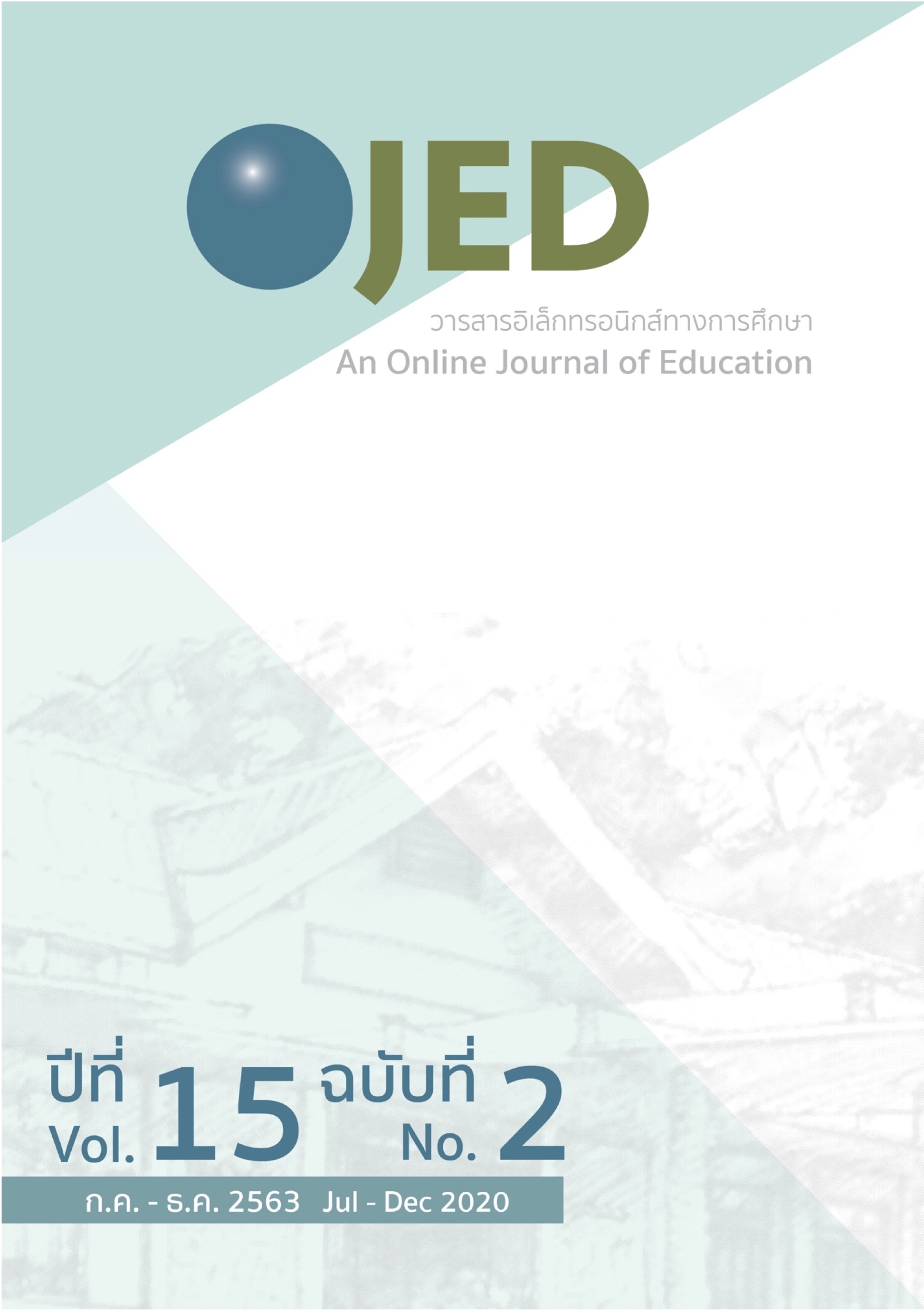A Study of English Language Skills Self-efficacy of EFL Learners with Different Levels of Language Proficiency
DOI:
https://doi.org/10.14456/ojed.2020.13Keywords:
English language skills self-efficacy, language proficiencyAbstract
This study aimed 1) to explore self-perception on English language skills self-efficacy of low, mid and high proficiency Thai grade tenth EFL learners and 2) to compare students’ English language skills self-efficacy among low, mid and high proficiency Thai EFL learners. The participants of this study were 269 of Grade 10 upper secondary students at six schools under the name of “BODINDACHA” school enrolling in Fundamental English course in the 2019 academic year. They were selected using random sampling technique. The research instrument was an English Language Skills Self-Efficacy questionnaire provided by the benchmark of grade 9 graduates from the Basic Education Core Curriculum B.E. 2551 (A.D. 2008). The data were analyzed with descriptive statistics of means, standard deviation and frequencies. For the inferential statistics, the data were analyzed by using One-way ANOVA to compare means differences of English language skills self-efficacy from the three groups of students.
The results showed that 1) high proficiency EFL learners ranked listening skill self-efficacy as the highest. Whereas, the highest ranked skill of mid and low proficiency groups was reading skill self-efficacy. 2) There was a significant difference of the average overall English language skills self-efficacy among three groups of learners. The overall language skills of high proficiency group significantly differed from mid and low proficiency groups
References
Abrar, M., & Mukminin, A. (2016). International graduate classroom discussion engagement, challenges, and solving-strategies: Stories from Indonesian students in a United Kingdom university. Asia-Pacific Collaborative Education Journal, 12(1), 5-20.
Alawiyah, T. (2018). Speaking self-efficacy and EFL student teachers’ speaking achievement. Edukasi: Jurnal Pendidikan dan Pengajaran, 5(1), 87-96.
Bandura, A. (1986). Social foundations of thought and action: A social cognitive theory. Prentice-Hall.
Bandura, A. (1997). Self-efficacy: The exercise of control. W.H. Freeman.
Biyaem, S. (1997). Learner Training: Changing Roles for a Changing World, Educational Innovation for Sustainable Development. Paper presented at the 3rd UNESCO-ACEID International Conference, Bangkok.
Brown, H. D. (2006). Principles of language learning and teaching (6th ed.). Pearson Education.
Dullas, A. R. (2018). The development of academic self-efficacy scale for Filipino junior high school students. Frontiers in Education, 3(19). 1-14. https://doi.org/10.3389/feduc.2018.00019
Education First. (2018). English proficiency index. https://www.ef.co.th/epi/
Eggen, P., & Kauchak, D. (1999). Educational psychology (4th ed.). Prentice-Hall.
Graham, S. (2011). Self-efficacy and academic listening. Journal of English for Academic Purposes, 10, 113-117.
Habibi, A., Sofwan, M., & Mukminin, A. (2016). English teaching implementation in Indonesian pesantrens: teachers’demotivation factors. Indonesian Journal of English Teaching, 5(2), 199-213.
Hager, J. L. (2017). The relationship of reading self-efficacy and reading achievement in second grade students [Master’s Thesis]. Scholar Works University of Montana. https://scholarworks.umt.edu/etd/11062/
Hasan, A. S. (2000). Learners’ perceptions of listening comprehension problems. Language, Culture and Curriculum, 13, 137-153.
Haryanto, E., & Mukminin, A. (2012). The global, the national and the local goals: English language policy implementation in an Indonesian international standard school. Excellence in Higher Education Journal, 3(2), 69-78.
Hsieh, P., & Kang, H. (2010). Attribution and self-efficacy and their interrelationship in the Korean EFL context. Language Learning, 60(3), 606-627.
Magogwe, J. M., & Oliver, R. (2007). The relationship between language learning strategies, proficiency, age and self-efficacy beliefs: A study of language learners in Botswana. System, 35, 338-352.
Mills, N., Pajares, F., & Herron, C. (2006). A reevaluation of the role of anxiety: self-efficacy, anxiety, and their relation to reading and listening proficiency. Foreign Language Annals, 39, 276-295.
Ministry of Education (2018). Basic Education Core Curriculum B.E.2008 (Revised B.E. 2017). http://academic.obec.go.th/newsdetail.php?id=75
Mondi, D. (2013). Effects of Strategy-based reading instruction on English reading ability and reading self-efficacy of lower secondary school students [Master’s thesis]. Chulalongkorn University Intellectual Repository (CUIR).
http://cuir.car.chula.ac.th/handle/123456789/42992
National Institute of Educational Testing Service (2018). Retrieved from
Naseri, M. (2012). The relationship between reading self-efficacy beliefs, reading strategy use and reading comprehension level of Iranian EFL learners. World Journal of Education, 2(2), 64-75.
Pajares, F. (1996). Self-efficacy beliefs in academic settings. Review of Educational Research, 66(4), 543-578. https://doi.org/10.3102/00346543066004543
Raoofi, S., Tan, B. H., & Chan, S. H. (2012). Self-efficacy in second/foreign language learning contexts. English Language Teaching, 5(11), 61-73.
Sağlam, D., & Arslan, A. (2018). The Development of English Language Skills Self-Efficacy Scale for Higher Education Students. International Journal of Psycho-Educational Sciences, 7(2), 1-15.
Shell, D. F., Murphy, C. C., & Bruning, R. H. (1989). Self-efficacy and outcome expectancy mechanisms in reading and writing achievement. Journal of Educational Psychology, 81, 91-100.
Schunk, D. H., & Pajares, F. (2002). The development of academic self-efficacy. In A. Wigfield & J. Eccles (Eds.), Development of achievement motivation (pp. 15-31). Academic Press.
Wang, T., & Rajprasit, K. (2015). Identifying affirmative beliefs about English language learning: Self-Perceptions of Thai Learners with Different Language Proficiency. English Language Teaching, 8(4).
Wang, C., Kim, D.-H., Bong, M., & Ahn, H. S. (2013). Examining measurement properties of an English self-efficacy scale for English language learners in Korea. International Journal of Educational Research, 59, 24-34.
Wiriyachitra, A. (2002). English language teaching and learning in Thailand in this decade. Thai TESOL Focus, 15(1), 4-9.
Zimmerman, B. J. (2000). Self-efficacy: An essential motive to learn. Contemporary Educational Psychology, 25(1), 89-91.
Downloads
Published
How to Cite
Issue
Section
License
Copyright (c) 2020 An Online Journal of Education

This work is licensed under a Creative Commons Attribution-NonCommercial-NoDerivatives 4.0 International License.




